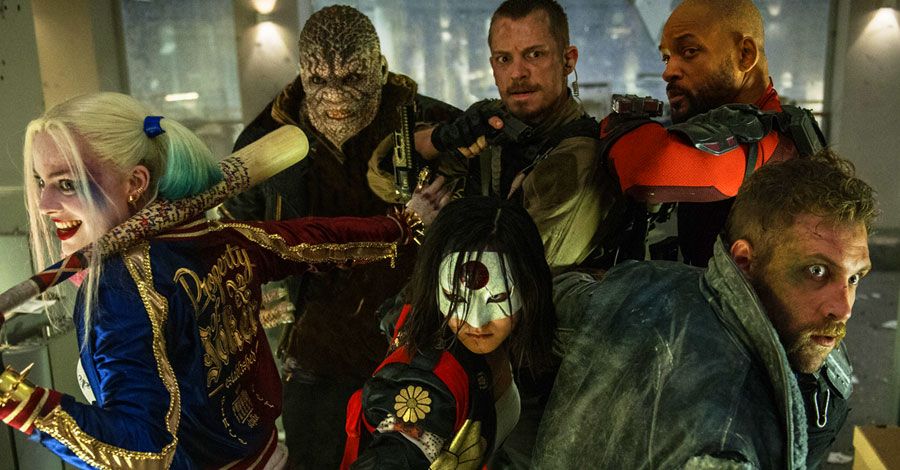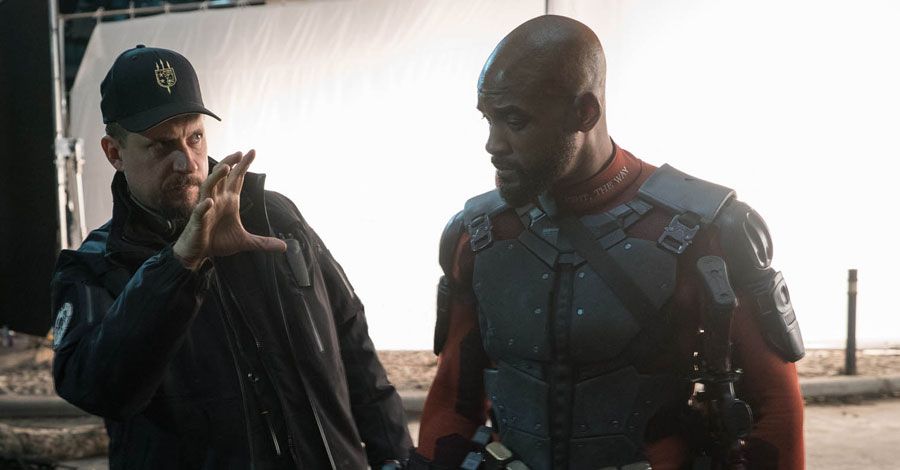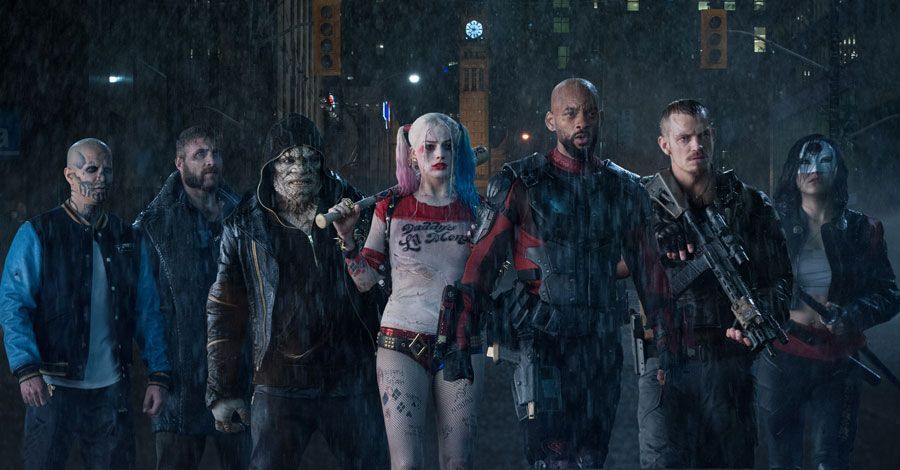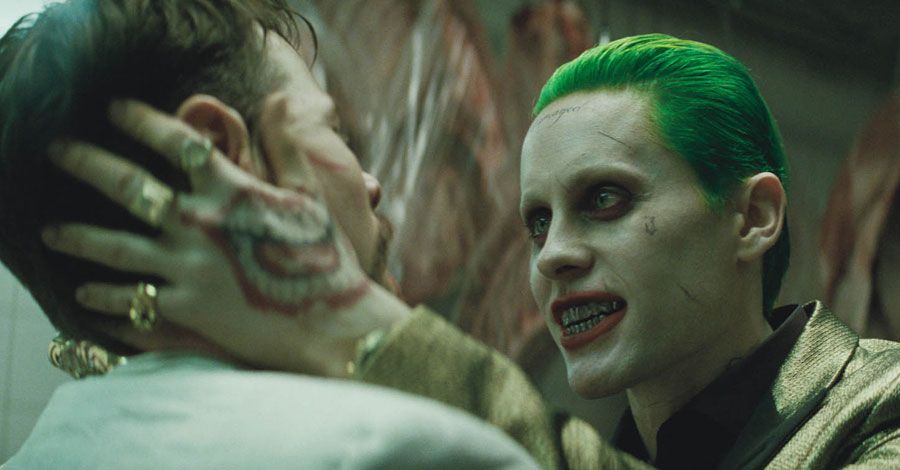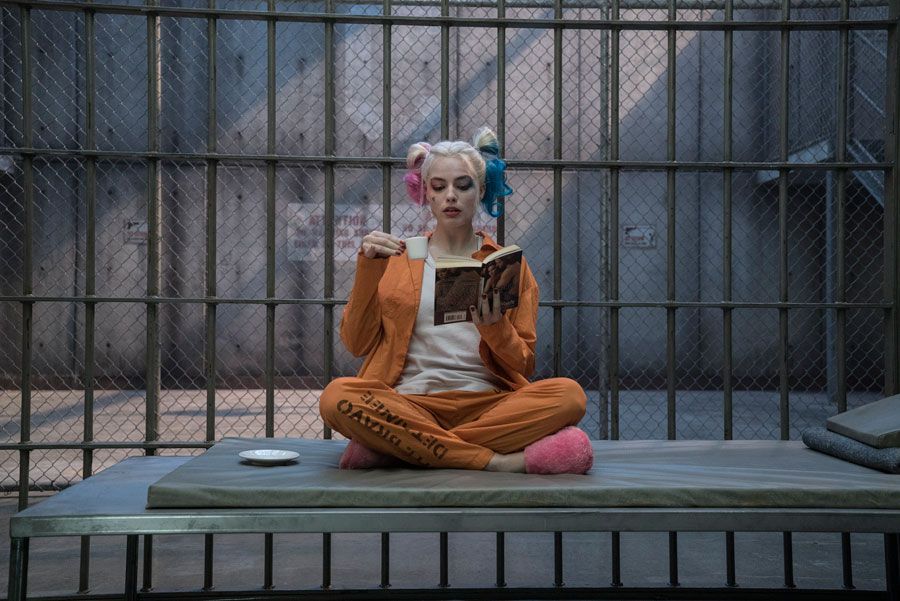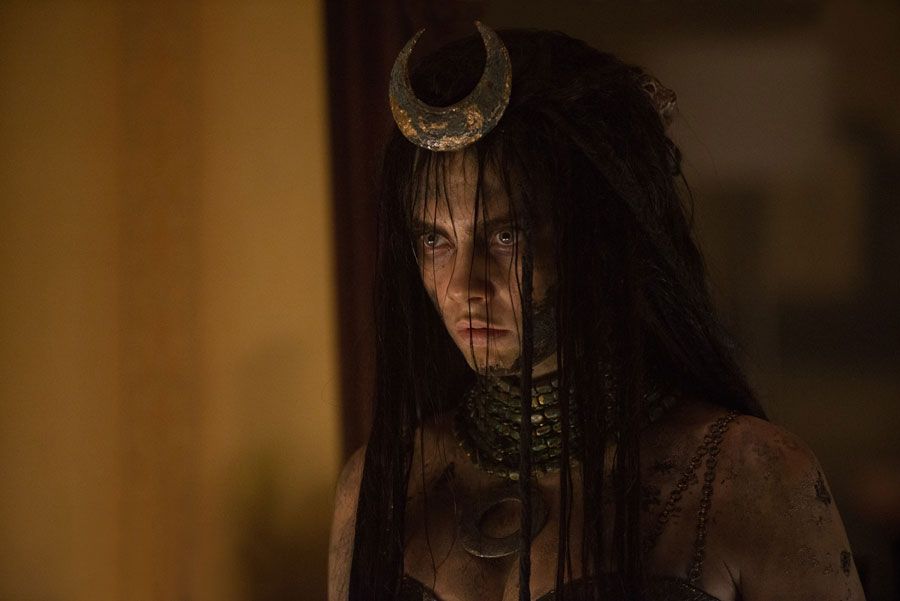"Suicide Squad's" Amanda Waller may bark the orders on screen, but behind the camera David Ayer calls the shots.
On a cool evening last July in Toronto, the director prepares his team of supervillains for the final showdown against the film's main antagonist.
A downtown street and buildings have been constructed behind Pinewood Toronto Studios, where Joel Kinnaman (as Rick Flag), Scott Eastwood and a group of soldiers await the approaching Task Force X in a scene drenched in manufactured rain. The tense standoff could easily escalate into an epic battle if it weren't for the circumstances: A desperate Flag needs the Suicide Squad's help to save the city. Ayer yells "cut" as the crew regroups for a second take. And then another and another.
Clearly, Ayer knows exactly what he wants from the scene.
Earlier that day, Ayer took a break on set in front of Deadshot's prison cell to speak with journalists about why "Suicide Squad" was the perfect film for him, how he narrowed down which characters to use, casting Will Smith, and who the mysterious Eyes of Adversary are.
Since we are sitting outside of Deadshot's cell, I wanted to ask about Will Smith, who has made a career out of playing the hero on the big screen, and casting him in this role where he's maybe not such a hero.
David Ayer: Antihero.
He's an antihero and not a supervillain? Are we making that distinction?
Probably a supervillain. He's a bad guy. They are all bad guys, that's the beauty of this. That's the fun of the genre. I think Will is incredibly versatile and can handle any kind of role you throw at him. It's funny because none of the normal words apply. When you say, "He's the father figure of the team," it's like herding cats. They don't care.
He definitely has that leadership quality. It's a great character for him because I think all these characters are conflicted and complex. So many times you feel like these genres are trying to inject complexities in what's a very black-and-white character. Good guys, who are doing the good thing. It's very easy to get ahead of them in plotting because you always know what the good guys are going to do. These guys can do anything. They are not bound by the normal rules. That's what makes it so fun to play in this space.
If that's the fun of it, what are the challenges of having protagonists that are bad guys?
You are talking to the guy who wrote "Training Day." For me, it's not going too far. It's very easy to go too far. At the end of the day, they are people with lives. They are people who have made bad decisions. You get into the question of, "Are you your worst day? Are you your worst act that you've ever committed? And should that define you? When you are defined in that way, is it immutable? Can you change? Can you learn? Can you grow?" A lot of this is about people that have been defined in an incredibly negative way and have absorbed and are maybe discovering that they are not so bad after all.
Your films are in the streets or in the military, or are very grounded and very contemporary realism or historical realism. What attracted you to finally getting into this world that has magic and superpowers?
It's interesting. It was really "Fury," because that was all about world creation even though it's a depiction of a historical event. You're trying to recreate things that exist and existed. It's not like you can run downtown and swing a camera. That taught me to swing a camera. That taught me to think in terms of creating a visual world and creating a layered visual world. I got excited to then take that level of control of what goes in front of the camera and apply it to the genre.
RELATED: "Suicide Squad's" Robbie and Courtney Let Loose as Harley Quinn and Boomerang
Plus, as a storyteller, there's a mythological power in comic books. In a lot of ways, comic book characters are really avatars for gods. They are very much like the Greek or Roman pantheon. There's something about the epic quality of that kind of character, of these characters that are avatars and almost have these superhuman powers. Some do have superhuman powers. To reverse engineer that into a psychological realistic space and execution, it just seems like the perfect assignment for me.
What was some of the comic book material that you looked at that really inspired you? Were you looking at the [John] Ostrander or the new [Adam] Glass stuff? And obviously taking characters that have never been part of the Suicide Squad comics and putting them in this movie.
You almost have to go back to the beginnings and look at Batman and look at the origins of Superman and start there and work your way through the canon and how it's evolved as society has changed. Certain elements haven't changed and certain elements have. The revolution going into the '90s and the graphic novel and [Frank] Miller's work - you sort of have to look at all that. For me, it was going into the original Suicide Squad, which was very interesting because it's a product of the bipolar world. These guys were fighting the Russians. It was very 80's and I'm a child of the '80s, so I totally understand where they were coming from. Then, you can really see how in today's world - where the government sometimes engages in murky activities to solve problems and make us safe - you could sort of see something like this happening and how it would happen today.
Can you talk about how you narrowed down which characters you were going to use and how they best serve the story?
Deadshot is a no-brainer because he's just a core element of that team. I got Harley Quinn through the New 52 version, but then I really started going, "OK, what's this character?" Then you get absorbed in her stand-alone things and then you get into her origins and her relationship with Joker. Defining that, it's salt and pepper. You have to have one thought with the other.
It is a lot of fun to see Boomerang, who is sort of the most villainous of all these characters. This has been a blast creating this absolutely out-of-control force of nature with Jai [Courtney, who plays Boomerang]. In character paradigms, he's evil-chaotic. It's like building a family and you just look for who is going to be complementary to each other and this is a new venture and it's a lot of characters to introduce. You're looking for that team and that family with interlocking skills that will complement everybody else's.
Building off that, were there any characters that you considered putting in, but had to cut out?
It's crazy how many characters there are. They keep killing them all and blowing their heads off. That's the beauty of this story: Nobody is safe. No matter who is in the movie, they are not safe. Anything could happen. There are definitely early rosters, but I think the core team was always there.
Can you talk about the conception of the Joker this time around, especially coming years after we had that iconic role?
When you have someone as talented as Jared -- and then I think when you accept that Heath [Ledger] happened and "The Dark Knight" happened -- you just move forward. We instantly know who he is. We know how he makes us feel. We know how he's going to behave. Just one little drawn picture of him, and a character that fantastically iconic and powerful, almost emerges by itself. Once you start touching that character and playing with that character, he really does reveal himself in a lot of ways. And he's so defined. Jared has done nothing short of utterly transforming himself. He's done an incredible amount of work with the mannerisms, his voice and everything. When he steps on set, you feel it. You feel the energy. The crew feels it. It's going to be, I believe, nothing short of a revelation.
Does he talk to you in his Joker voice?
Yeah, when he shows up here, he's in character. When he's in his trailer, he's in character. When he emails me, he's in character. It's like, "Whoa. He's a little fucking scary." It would be nice to see Jared again. It's been a while.
We've heard a lot today about the Eyes of Adversary. Could you talk a little bit about that concept and maybe put them into context for us in the course of the film?
I had a dream. They are really disturbing. It's hard to come up with bad guys and it's hard to come up with creatures. I think it's one of the most difficult things. If you look at modern development in film, it's brutal. You want to do something fresh, yet I also want to do something very specific to this world and unique. I think we kind of nailed it. It's sort of related to the bad-guy stuff, and the bad-guy stuff is very much a sealed, locked box.
But, it's an idea, it's a concept that you came up with? It's not from anything in the comic books? It's your own creation and addition to the movie?
Only in the sense that if you look at Joker, he has his henchmen. There's always the henchmen concept in comic books. The specific visuals and what they are and how they work, sure. But, it's very much out of canon that you have these armies of servants.
Obviously, you may have heard that there are a lot of DC Comic movies that are going to be coming out now. How much connective tissue is there into the past and future of this new DC cinematic universe? How do you apply that idea that they are building this bigger world?
Watch this space. Get ready. That's all I'll say. Just get ready.
RELATED: You'll Fall in Love With Killer Croc, Promises "Suicide Squad'" Star
Just to expand on that. Can you talk about incorporating Batman? Was that in the original script? Was that something Warner Brothers came to you about or did it stem from conversations with Zack Snyder?
If you are going to do a DC comic book movie, you want Batman. I'm a little bit of a fanboy. I grew up reading Batman comics and there was the old Adam West show. I had the toy car. It's something important to me. I think it's every filmmaker's dream to be able to be given such an iconic asset like that and really see when the suit shows up on set - you have Ben [Affleck] in the suit - it's really like, "Fuck!" It's really cool.
Grown men cry.
Yes, grown men cry.
Was Batman in the original script, though?
Absolutely. The short answer is, "Yes."
As a filmmaker, do you look at this as a stand-alone picture? "I'm going to make one movie," even though I'm sure the studios and everyone would love a trilogy to come out. Do you just look at one or do you set threads for possible sequels?
Because of the nature of the comic book universe and the DC Universe, it's really infinite in any way you can go, especially the DC Universe. I think it's one of the most complex fiction universes with "Crisis" and pre-"Crisis" and the multi-dimensional nature and all the timelines. Each one of these characters could be their own film. The Suicide Squad could be a zillion films. The backbone of this story is right out of canon, and it's one comic book. I'm not going to say which one. That's just one out of a two-foot stack. The potential is always there, but as a filmmaker, you have to make the movie work and stand it up on its own two legs and be utterly complete as an experience. Otherwise, you are doing the movie injustice.
You said Joker was the rail when it comes to comic book fans, but Harley Quinn is a character that people have been demanding more and more of. When you touched on it earlier, you implied that wasn't, "I've got to put Harley in this movie. That's my reason for doing it. It just came out naturally."
No, I wanted Harley. She's freaking cool. She represents so many dichotomies in today's world where everything is so sensitive and you can't talk about anything or represent anything and you can't do anything. She doesn't care. She transcends everything. That's what is so fascinating about her. She's so many things, and such a powerful woman who is living life on her own terms and so honestly in the moment. And, a person who has an incredible joy in the moment. It's great to be able to work with that character. Margot [Robbie] is kicking her out of the park. Unbelievable. She's doing her own stunts, too. I've never seen that. Incredible.
You have about a month left of shooting. Is there something, or someone, that really took you by surprise once you got into the shooting process and started putting stuff on film?
It's such a huge animal that it's almost hard to break it up that way. The good news is everything came together. Everything worked because when you prep a movie, it's guess work. Will this work? Will the wardrobe work? Will the costumes work? Will this characterization that the actors are doing work? The special effects. The methodology. The techniques. Everything is so in-camera and realistic and practical. Sure, there's CG, but we don't want to lean on it. All these guesses somehow came together, but it's less about any one thing and more about how shocking the chemistry between the actors has become.
They are like thick as thieves. They are scary together. They are like this little gang now. They are truly like a posse. It's a wonder to behold. That's not normal in this business, sadly, because it's a very isolated business. You have actors and they go from show-to-show and travel and live out of suitcases. It is a very isolating lifestyle and I don't think people understand that. To see people willingly hang out on set when they are not working - and they are always together, even when they don't have to be - is rare.
How would you describe the tone of the movie? The early buzz is it's very dark. There were reports that you had therapists on set for the actors. Today we've been getting a lot about how funny it is. I wanted to get your perspective on it.
It's both. We're out of our freaking minds now. The Greek symbol of drama is a happy mask/sad mask. If you have too much of one, it's imbalanced. I think the best movies are the ones that can make you double over in laughter and cry, which I hope this will do for the audience. I think people will be really surprised by how much humor is in the movie. But, at the same time, it's like an honest, situational, character-based humor versus the low-hanging fruit. You really believe it.
You want "Suicide Squad" to be real and gritty, but you also have the Enchantress, who is a magical character. What was the thought process behind introducing the supernatural element?
Magic has been seen throughout human history, and the belief in the supernatural and the belief in transformative abilities. Even today, there's people of faith that believe in miracles and there's a pantheon of world gods, all with these amazing abilities. All the answers are there.
As a filmmaker, how are you dealing with the fan anticipation and the fan scrutiny on a movie like this? What's that like, dealing with the DC world?
It's impetus to not fuck it up. I'm a fan, too. I believe in canon and I believe in being respectful to how storylines and characters interlock, and understanding how not to break things, I think, is the number #1 thing. How not to break a character, how not to do something that encroaches on the storylines and histories - it's like archaeology.
"Suicide Squad" opens Aug. 5.

